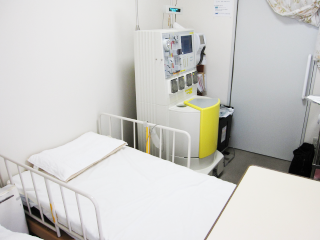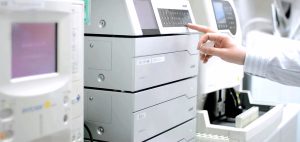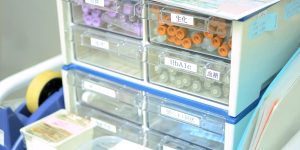Contents of ANK

Activate and Proliferate Extracted NK Cells by Ex Vivo Culture
“Wild” NK cells extracted from the human body are known to attack any kind of cancer cells if the NK cells’ activity is high. However, since NK cells proliferate slowly, large quantities of NK cells are needed to culture them in large numbers.
For this reason, ANK therapy uses a blood component separation device to separate and collect lymphocytes including NK cells from 5~8 liters of blood through extracorporeal circulation. Most of the blood components will return to the body and, even if all the lymphocytes in the blood are extracted, there are 100 times more lymphocytes outside the blood in the body to cover the decrease so there is no worry of blood decrease or lymphocyte decrease.

Including preparation, separating and extracting lymphocytes takes about 3 hours. We understand some people, who have damaged blood vessels with anti-cancer therapy or those who have other kinds of diseases, are worried about circulating large amount of bloods extracorporeally. Therefore, our doctor will diagnose the patient’s blood vessel condition upon separation and collection of lymphocytes, so please be assured. If lymphocyte separation and collection is not possible, we may perform whole blood collection with syringe. Our doctor will explain the details during the interview. The collected “concentrated” lymphocytes will be brought to the cell culture center in Kyoto on the day of the collection. You may hire a specialist to transfer the cells or bring it over on your own.
Return Cultured Cells to Patient’s Body Through Infusion
In general, cultured cells will be returned to the body through infusion. The treatment schedule will be arranged according to the anti-cancer therapy’s schedule, if the patient is taking them, and the patient’s convenience. Basically, infusions are done every 2~3 days, or twice a week. Cultured cells are kept frozen so the treatment schedule can be planned flexibly.
There are three main effects expected in cultured cells.
i. Cultured NK cells attack and damage or kill the cancer cells directly in the body.
ii. Cultured NK cells release immunostimulatory substances in the body, which wakes up a large amount of NK cells sleeping in the body.
iii. Cultured NK cells relieve immune suppression in the body resulting in CTL cells* joining in attacks on cancer cells.
*CTL cell is a type of T-cell, and only a few of them that match the cancer cells’ receptors have the ability to attack the specific cancer cells.
Side Effects (Side Reactions)
In the case of immunotherapy, it is generally called side reaction, but it corresponds to the word “side effect” in the case of medicine. After the infusion of ANK therapy, various immune side reactions occur. The immune side reactions differ according to each patient. Most of the side reactions are fever and chills. There are various others but they are similar to a cold without any sore throat or cough. However, none of the side reactions are reported to be severe or life-threatening. For more information please consult with our doctor.
The side reactions are transient and quickly cured. However, after the first infusion treatment, waves of fever may occur several times repeatedly, and it is necessary to watch the patient’s condition for the first 2~3 days. Starting from the second infusion treatment, the fever will not last for days and reaction symptoms will be reduced. Rarely, side reactions will not occur on the first or second treatment but strongly appear on the third treatment. We will discuss on how to deal with side reactions during our interview.
Any Cancer Type Including Blood Cancer are Treatable
NK cells travel all over the body and attack cancer cells as soon as they are found. Since this treatment uses NK cells, the site or type of the cancer will not be a matter. It is even proven to be effective against cancers such as ATL (Adult T-cell leukemia) for which no standard treatment has yet been established. In the case of leukemia, cancer cells are mixed with immune cells that are extracted from blood, and since the cancer cells also proliferate during the culturing process, immunotherapy generally cannot treat leukemia unless pretreatment is performed to eliminate cancer cells that are mixed together. In ANK therapy’s case, NK cells themselves eliminate cancer cells during the culturing process, which makes it possible for ANK therapy to treat blood cancers. However, it is necessary to consider the condition beforehand since it may become difficult to culture if there are too many cancer cells mixed within the extracted immune cells.
Cases of ANK therapy proven effective on treating ATL have been introduced at international conferences and papers.
Click here (English)
Newspaper coverage on ANK therapy.
Click here (Japanese)
In the case of brain tumors or leukemia, there are restrictions and special conditions to consider, so please consult with our doctor during the interview.
Combination of Molecular Targeted Drugs can Increases the Efficiency of NK Cells
Molecular target drugs themselves do not attack cancer cells, but they also do not attack normal cells such as immune cells. Molecular target drugs aim to exert their therapeutic effect by applying brakes on the growth of cancer and increasing the activity of NK cells in the body (ADCC activity). Our doctor will carefully consider and determine whether a molecular target drug can be used. If the patient agrees to administration of the drug, it will be used in combination with ANK therapy.
Treatment is Possible while Continuing Work
The degree of side reactions varies according to each patient. Some people take a day off work only on the day of the treatment, and some people adjust their schedule to receive treatment without taking the day off.


